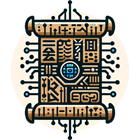 Keynote speakers
Keynote speakers
Vesuvius Challenge, Educe Lab, Stanley and Karen Pigman College of Engineering
University of Kentucky - USA
- Bio: Dr. Stephen Parsons completed his PhD in computer science in 2023, pioneering the use of machine learning to detect the elusive carbon ink on the Herculaneum scrolls from CT scans. These methods have now been extended by a worldwide community through Vesuvius Challenge, a global research contest for which Stephen is the Project Lead.
Virtually Unwrapping the Herculaneum Scrolls
- Abstract: The Herculaneum scrolls are the only surviving library from classical antiquity. Buried by the eruption of Mt. Vesuvius in 79 CE, the carbonized papyrus rolls are extremely fragile and have resisted reading efforts – until now. Using noninvasive imaging, virtual unwrapping, and machine learning, we can now begin to read these once lost texts.
This talk will review the quest to recover the Herculaneum papyri, starting with an idea 20 years ago and culminating with the ongoing Vesuvius Challenge, an international research competition to solve the riddle of these scrolls.
Human Language Intelligence Lab, College of Computing and Informatics
Sungkyunkwan University - South Korea
- Bio: JinYeong Bak is an assistant professor in the Colleague of Computing at Sungkyunkwan University. His research interests include analyzing human conversational behaviors and building machine learning models from the insights of the analysis. He worked at Microsoft Research Asia as a research intern and United Nations Global Pulse Lab Jakarta as a junior data scientist. He holds a Ph.D. and M.S. from the KAIST and a B.S. from Sungkyunkwan University. His research has been published in ACL, EMNLP, NAACL, ICML, CHI, and WWW.
Applying ML to Historical Corpora: Translating Classical Korean Texts to Contemporary Korean and Analyzing Monarchical Ruling Styles
- Abstract: Historical records in Korea before the 20th century were primarily written in Hanja, a classical Chinese script that is not understood well by modern Korean or Chinese speakers. Historians have been analyzing these documents, but the process is very difficult and time-consuming. For example, the Annals of the Joseon Dynasty (AJD), which are daily records of Korea's five-century-long monarchy, were originally written in Hanja and translated into Korean from 1968 to 1993. However, this translation was overly literal and contained many archaic Korean words. A new expert translation effort began in 2012, but in the past decade, only the records of one king have been completed.
To address these challenges, we curated a new Hanja dataset from the AJD to better understand Korean historical records. Then, we developed a neural machine translation model that translates Hanja documents into more easily understandable Korean. Leveraging multilingual neural machine translation, our model learns from a comprehensive dataset of outdated Korean translations and a smaller dataset of contemporary Korean and English translations.
Using these historical documents, we further analyze the texts to understand the ruling styles of the kings. Decision-making in groups involves resolving issues by discussing them with group members. Much of the existing research on decision-making relies on surveys or laboratory environments, which can introduce participant bias. To investigate decision-making behavior in a natural context, we built discussion records from the AJD and created machine learning models to predict kings’ decisions and analyze the patterns. Additionally, we are investigating the impact of uncommon natural phenomena on ruling styles from the historical documents.
 Keynote speakers
Keynote speakers